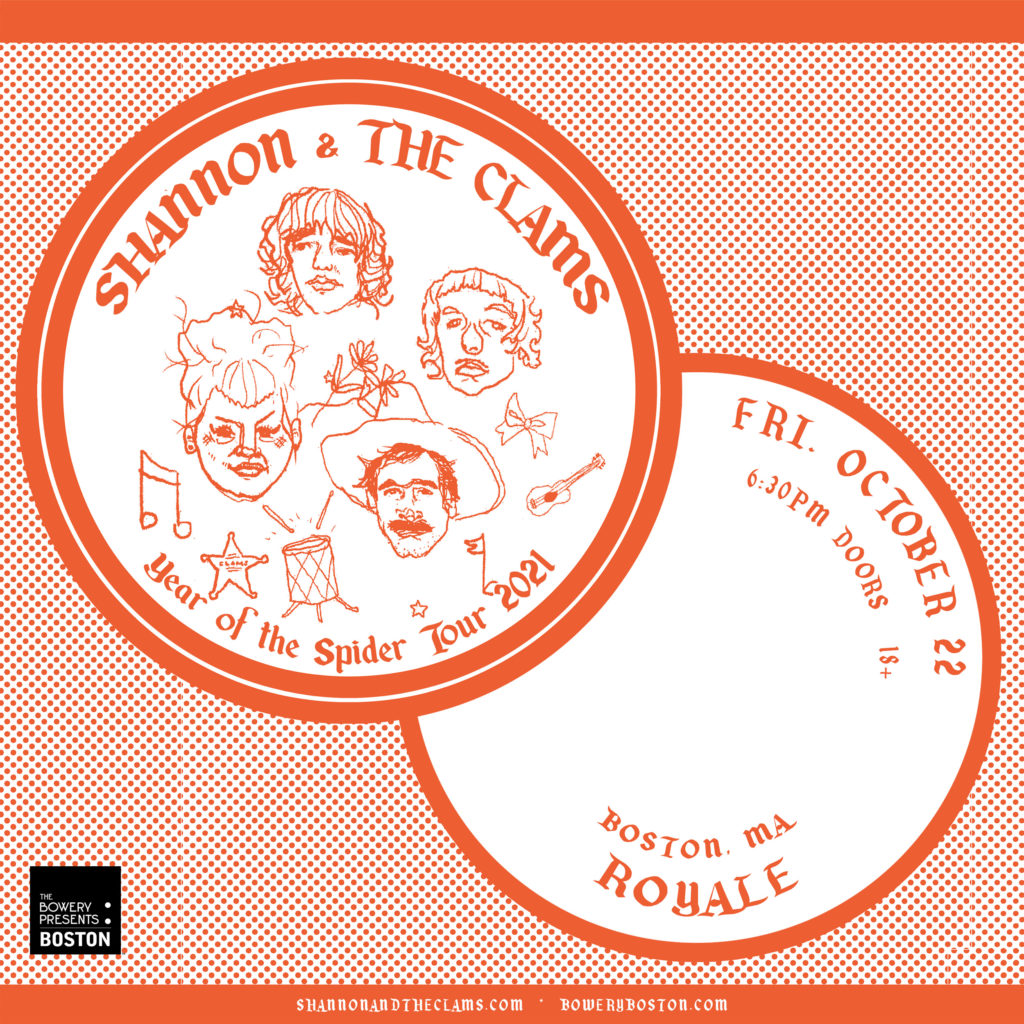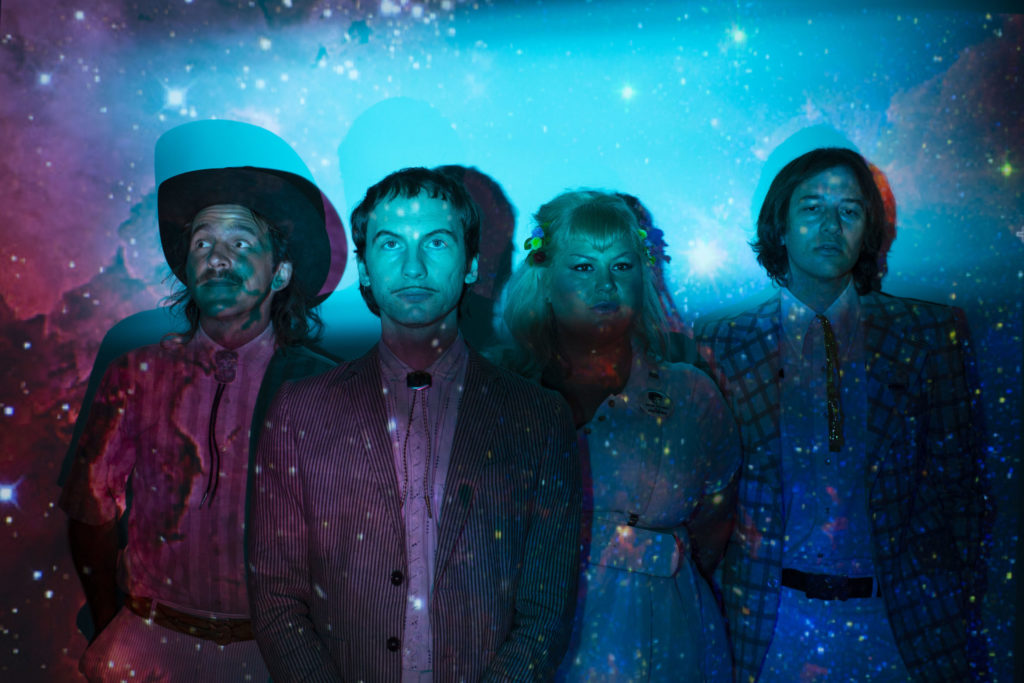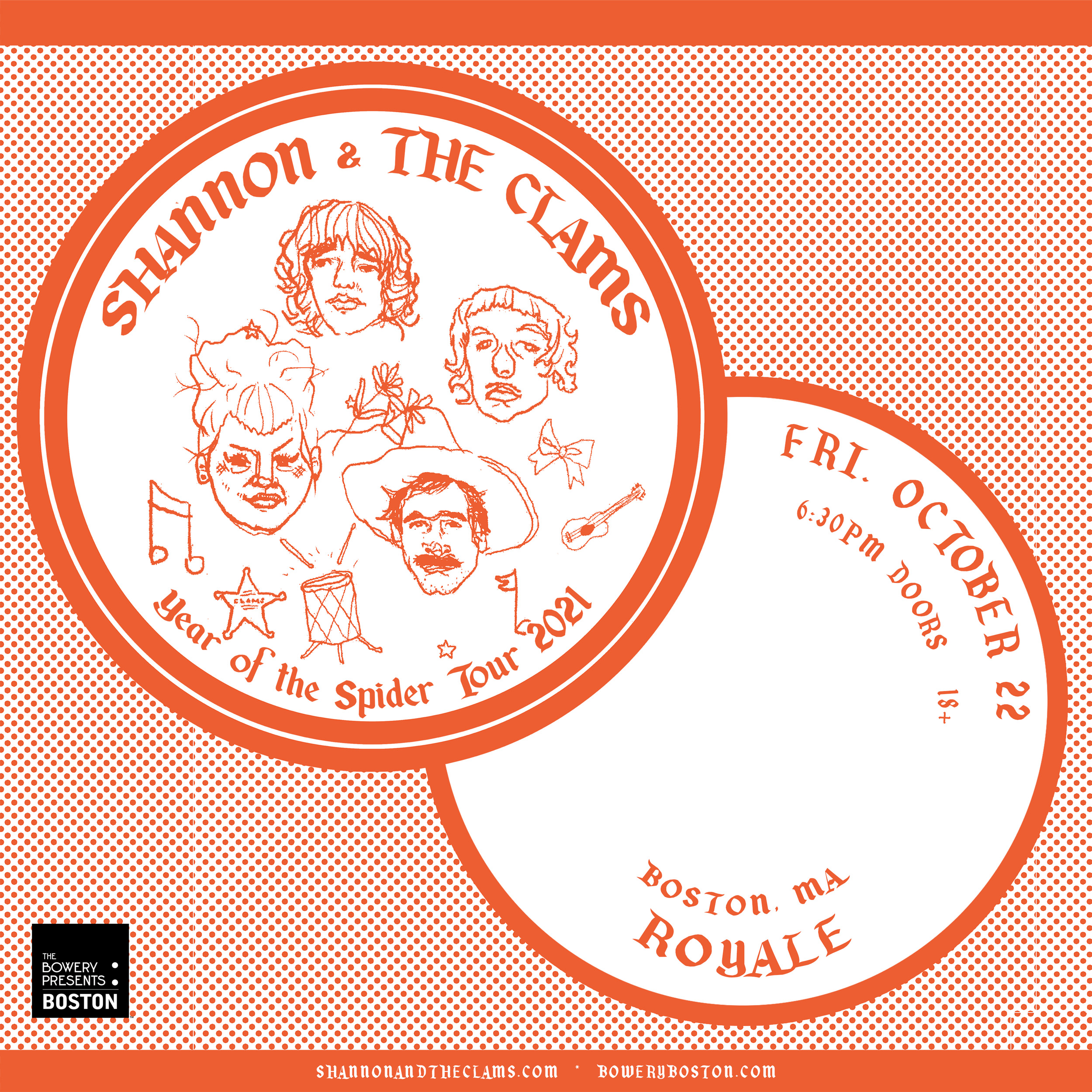Presented by Bowery Boston
Doors: 6:30 pm / Show: 7:00 pm
Please Note: All events beginning 10/1/2021 will require attendees to show evidence of their full vaccination against COVID-19. Full vaccination means 14 days or more have passed since the attendee has received a single-dose vaccine or the second dose in a two-dose series. Acceptable vaccination documentation may be a physical copy of a COVID-19 Vaccination Record Card, a digital copy of such card or such other proof as is permitted locally. The City of Boston Public Health Commission is requiring all attendees to wear a mask while indoors in a public setting. In addition to the above, please check https://royaleboston.com/policy-faq/ for information on any local rules or restrictions.
Age Limit: This show is open to 18+. Patrons under 18 admitted if accompanied by a parent or guardian.
Opening acts and set times are subject to change without notice. All bags larger than 12 inches x 12 inches, backpacks, professional cameras, video equipment, large bags, luggage and like articles are strictly prohibited from the venue. Please make sure necessary arrangements are made ahead of time. All patrons subject to search upon venue entry.
***

***
Shannon and the Clams

“I am terrified of spiders,” says Shannon Shaw. “My mom always told me that they’re drawn to me. Like, they would drop down and dangle in my face as a baby, or they’d get in my bed.”
But the powerhouse singer-bassist of retro-rock band Shannon & The Clams had bigger fears when she went to an astrologer two years ago. Shaw was at an emotional tipping point — willing to try anything — because everything she loved was falling apart.
“It felt like the end of an era,” Shaw says, which began to unravel in 2016 with the tragic Ghost Ship warehouse fire in the Clams’ DIY community in Oakland. In 2018, the California wildfires in Napa almost caused her parents to evacuate their homes. In 2019, a lurking intruder drove Shaw out of the beloved apartment she’d lived in for 14 years. And then, right as her band was getting invited on big tours with bands like Greta Van Fleet and The Black Keys, her father was diagnosed with cancer. “The idea of leaving my family was agonizing — it was torture,” Shaw says.
The astrologer told her to summon Durga when she felt powerless, a Hindu goddess who holds a weapon in each of her eight arms. Shaw saw the connection. “The symbolism of the spider made a full turn in an interesting way,” she says. “I was getting protection from the thing I feared the most.” Plus, she says with a laugh, “Spiders destroy the bullshit bugs. Like mosquitoes. Who needs ‘em?”
Year Of The Spider, the band’s sixth studio album, rages against death and disease with the power of a thousand angry Ronettes. Songs like “All Of My Cryin’,” “Mary, Don’t Go,” and “Year Of The Spider,” pulse with girl-group elegance and punk ferocity. On a Clams record, you always get both.
That harsh/soft balance often comes down to Clams keyboardist Will Sprott. “Different keyboards lend themselves to different tones,” Sprott says, “a Rhodes [piano] is more soft and bell-like, whereas a Wurlitzer has these chunky, abrasive bites. So when I’m deciding which instrument to play on a song, I’m thinking, what does the song make you feel? What do you want it to communicate? It’s like, do you want this organ to scream at you or soothe you?”
On the album opener, it was a little bit of both. “Do I Wanna Stay” is a slow tango between Shaw’s voice and Sprott’s piano that builds to a break point when Shaw rasps, “I dream at night…” sounding like someone whittled Brenda Lee into a shiv.
“We went line by line with a fine-toothed comb to make sure the instrumentation matched each scene, almost like a movie,” Sprott says, adding, “That’s one thing about having Dan [Auerbach] as your producer — he is really good at seeing an overall vision of the sound — knowing when and where to add or remove certain layers.”
Drummer Nate Mahan agreed, saying “Stay” was a true collaboration. “Shannon had a very unique idea about the tempo of that song that we had to work out with Dan … The timing took us quite a while to get right, but I’m really proud of how it came out.”
When Mahan moved to Oakland in 2007, he was a fan of the band before he joined. “I was in a lot of improvisational and noise bands in a city that has every micro-genre you can imagine floating around … Shannon and the Clams stuck out to me because they had great songs with great singers, which I thought that really lacking in Oakland at the time.”
Mahan’s intuitive approach shines through on songs with dense imagery like, “Mary Don’t Go” — one of Shaw and Auerbach’s favorites. “I wanted to leave space for the words and pull back [on the drums],” Mahan says. “When you slow the pace, the words can feel more powerful.”
On “Godstone,” which tells the story of a surreal underwater encounter Shaw had in Hawaii, Mahan ditched the drums completely and played a halting, horn-like piano line while Sprott added the eerie arpeggiated synths.
The other source of the Clams’ signature sound comes from the decade-long creative partnership between Shaw and Clams’ guitarist Cody Blanchard. In “I Need You Bad,” their voices lock into bewitching minor chords. “It’s like a zipper when we sing together,” Shaw said, “I think we have a blood harmony, though we’re not related.” Bands that do have blood harmonies — the Everly Brothers, the BeeGees — are major musical touchstones for them. But unlike those groups, Shaw, Blanchard are close friends. They live 15 minutes away from each other and when both are in town, will rehearse in the goat shed turned recording studio that Blanchard built in his yard.
Blanchard mixed Spider at Dan Auerbach’s Easy Eye Sound Studios the same week tornadoes devastated parts of Nashville right before the COVID-19 shutdowns in early 2020. He also wrote and sings lead on roughly half the songs on Spider. His songs, like “Flowers Will Return” and “In The Hills, In The Pines,” have swelling pop arrangements and a mysteriously sparse falsetto, reminiscent of bands like The Hollies and The Association.
As a songwriter, Blanchard said he can get neurotic, so he tried Dolly Parton’s trick: writing songs from another person’s point of view. It worked, yielding some of Spider’s darkest songs: the howling “Crawl,” which has a roiling hard-rock guitar (“that was really fun — just a classic, rippin’ ‘70s guitar solo”) and the album’s first single, “Midnight Wine,” a thundering baroque-pop number that was inspired by friends and people in the Oakland arts community who died of drug overdoses over the last few years.
“I was thinking specifically of the feeling of alienation,” said Blanchard. “Where it feels like nothing in society works for you. The only thing that makes sense is to get fucked up to the point where you don’t care if you die or not because life is too difficult and bleak.”
Spider ends with the slinky Motown-esque, “Vanishing.”Shaw dons her spiritual spider armor once more, singing directly and poignantly to her father (who is doing well, she said.) At first, Shaw wondered if the lyrics were too personal to put on the record.
“It’s very emotional, very tender,” she said. “I also had these ideas that made no sense, like having the weird call-and-response, but we made it work so it was one of those songs that gave me the chance to grow.”
***
Delicate Steve

TILL I BURN UP
“In a time where nothing makes sense, or when everyone is trying to make sense of everything, even the right idea might not make perfect sense to everybody at that moment.”
Steve Marion, the songwriter, guitarist, and producer who has made four studio records of primarily word-less, guitar-first music as Delicate Steve, is talking about the bifurcated and reactionary culture of the moment. But by no coincidence he’s also describing musical moments that helped to inspire Till I Burn Up (Anti-, 2019) his forthcoming LP.
The album name comes from a line in Dr. John’s “Walk on Guilded Splinters” where Steve misheard John’s actual phrase “Tit Alberta” as “Till I Burn Up.” But more than fodder for an album title, John’s Gris Gris, and records like it, informed a new frame-of-mind for an artist who has historically set out to make a predetermined statement with every recording.
“The idea of this young freak making Gris Gris in LA, and nobody knowing what to do with it in 1968… He gave me confidence to be a little more freaky and abstract instead of quirky and nicely-packaged like my last album was.” Steve goes on to cite early records by Iggy Pop and Dylan and The Band’s electric tour that were panned at the time and lauded in hindsight. “There is a confidence that comes with abandoning the idea of wanting to create something that everyone might like to check out.”
But all is not bifurcated, and we know two things can be true at once. The confidence necessary for Steve to make Till I Burn Up could also be self-inspired. Now nearly ten years into his career, Steve is a cult artist of his time who has been called to record with his heroes (Paul Simon, Kanye West) and contribute significantly to his contemporaries’ modern masterworks (Amen Dunes, Freedom), all the while recording and releasing his own critically hailed work and sharing the stage with Tame Impala, Mac DeMarco, Growlers and others.
The artist whose songwriting and playing has been marked through by transcendent moments of buoyancy and joy has created a pulsing and propulsive record in Till I Burn Up. He put up at a studio in Woodstock and found himself playing Freddie Mercury’s Oberheim synthesizer and his guitar plugged into Robbie Robertson’s Fender amp.
With the intent to turn away from the times, Steve managed instead to document the sound of this moment — the ever-undwinding feed that feeds the feedback loop of talking heads, twitter tick-ticking like a bomb, the timed drip- like morphine- of news breaking in our hands, the party before the shoe drops, our interior dialogue, all the contradictions…
A song called “Freedom” is underpinned by a grinding circular guitar line interrupted by what sounds like synthetic warning sirens. “Rat in the House”, “Rubberneck”, and “Madness” are blinkered dancefloor rippers suited for a bunker party. “Selfie of Man” recognizes the pervasive behavior and its result, as a literal portrait of our times. It moves along in marched lockstep, with inversely reflecting guitar lines. The album’s closer ‘Dream’ allows Steve and his listeners some free range. Until then, each song is self-contained and self-referential — an ouroboros within a greater ouroboros called Till I Burn Up.
There are turns on Till I Burn Up as dark as anything Delicate Steve has recorded, but not without reminders that a joy ride into an apocalypse is still a joy ride. Like the harrowing moment it documents, Till I Burn Up would not be true if not imbued by contradiction. True to form, this Delicate Steve record is a distillation.



